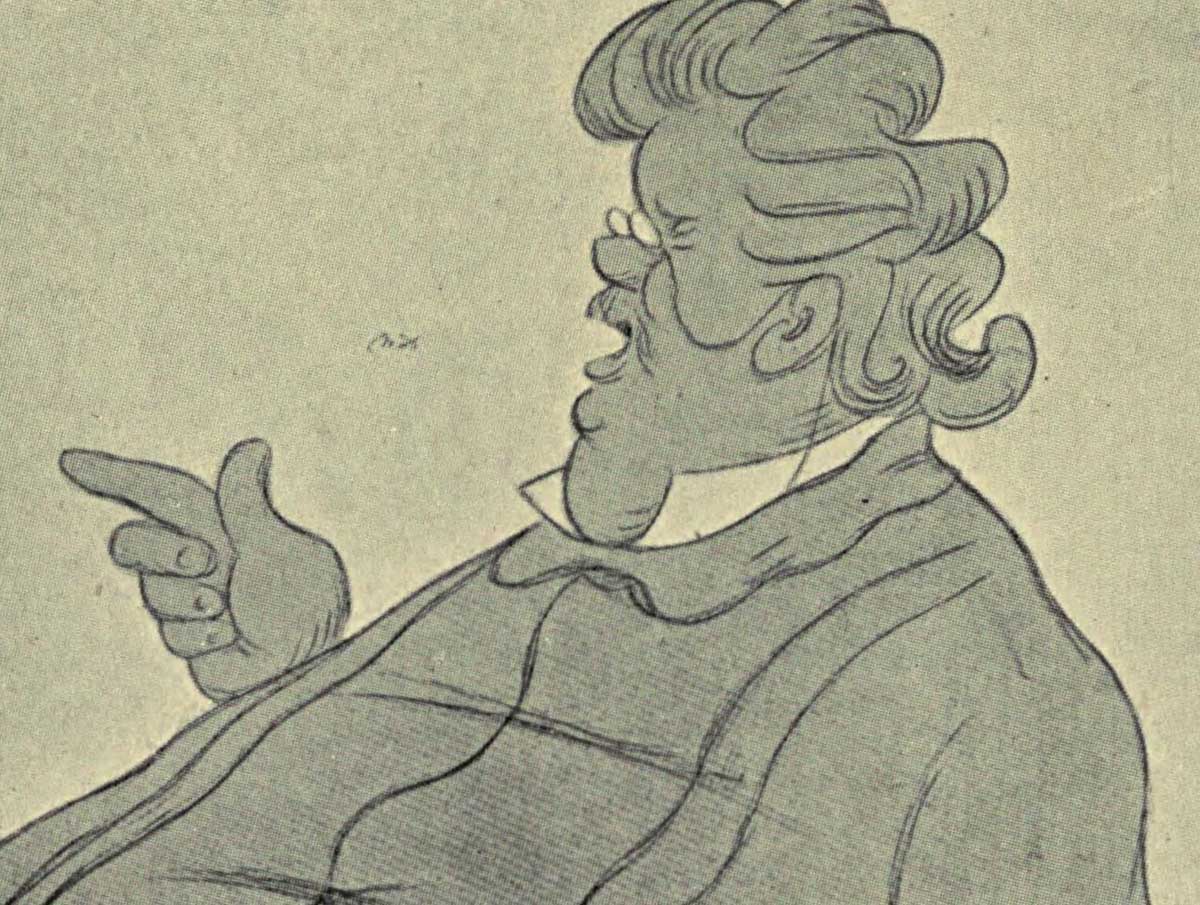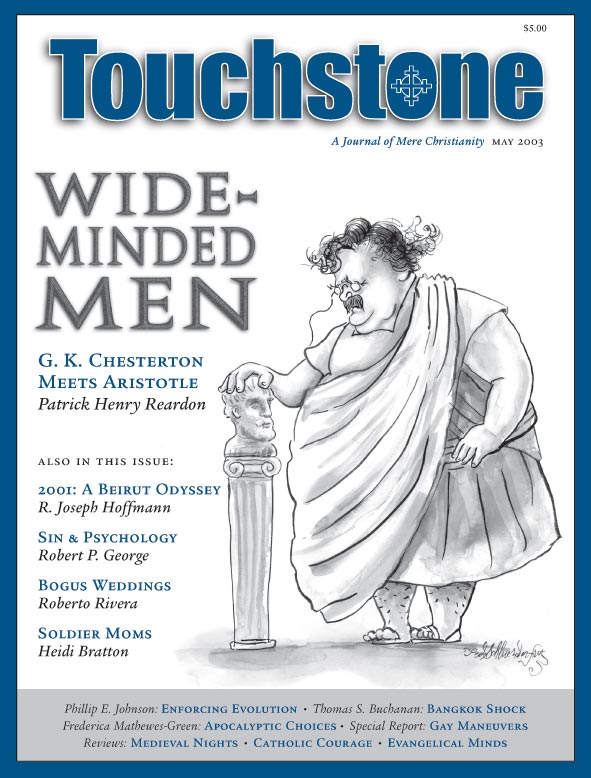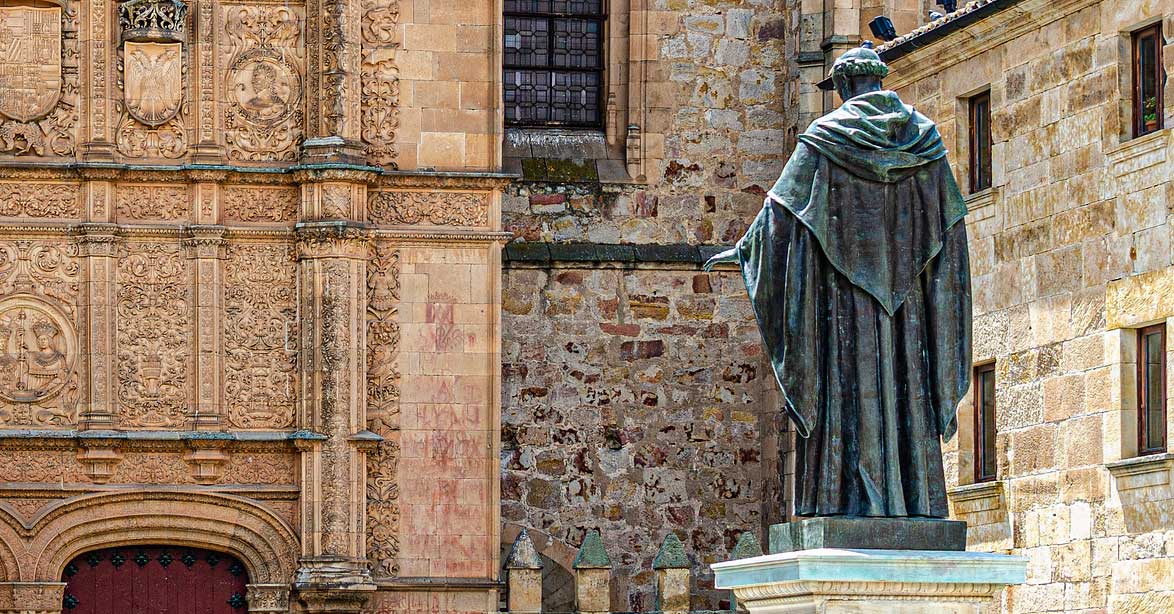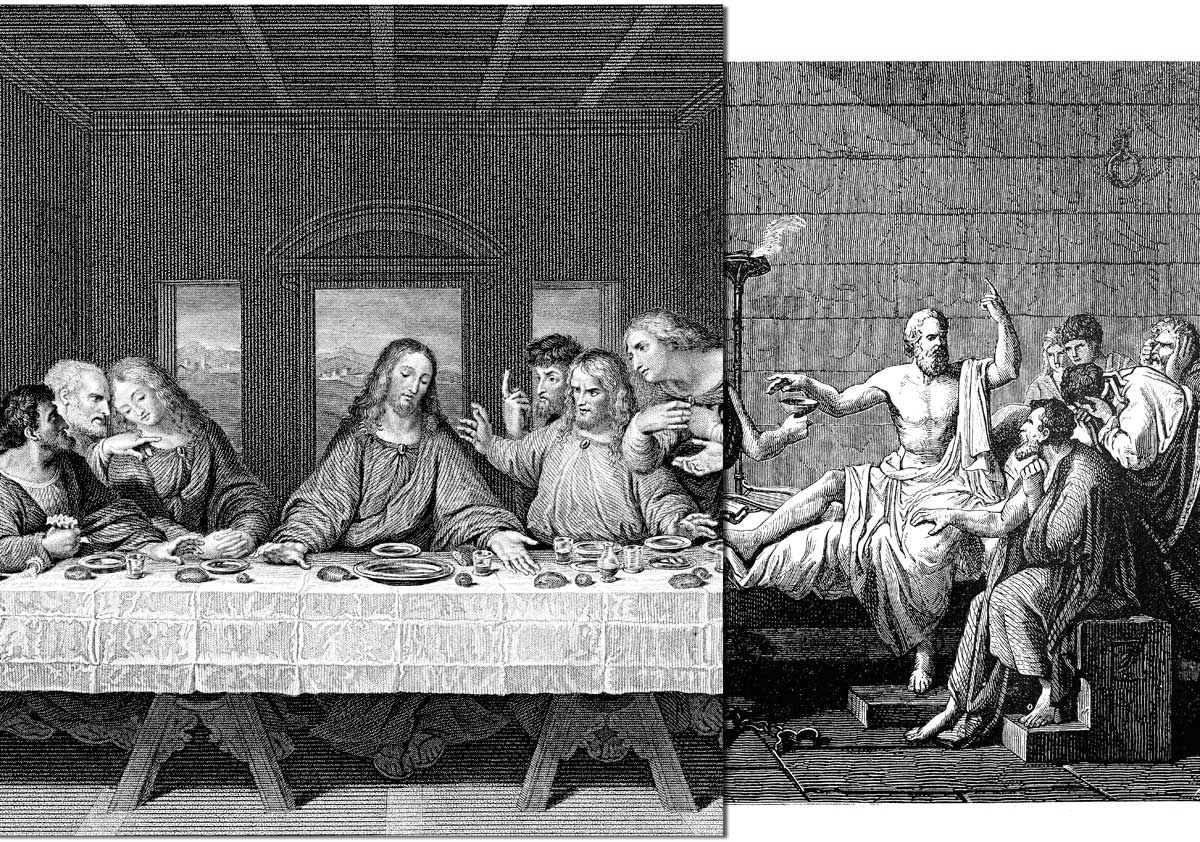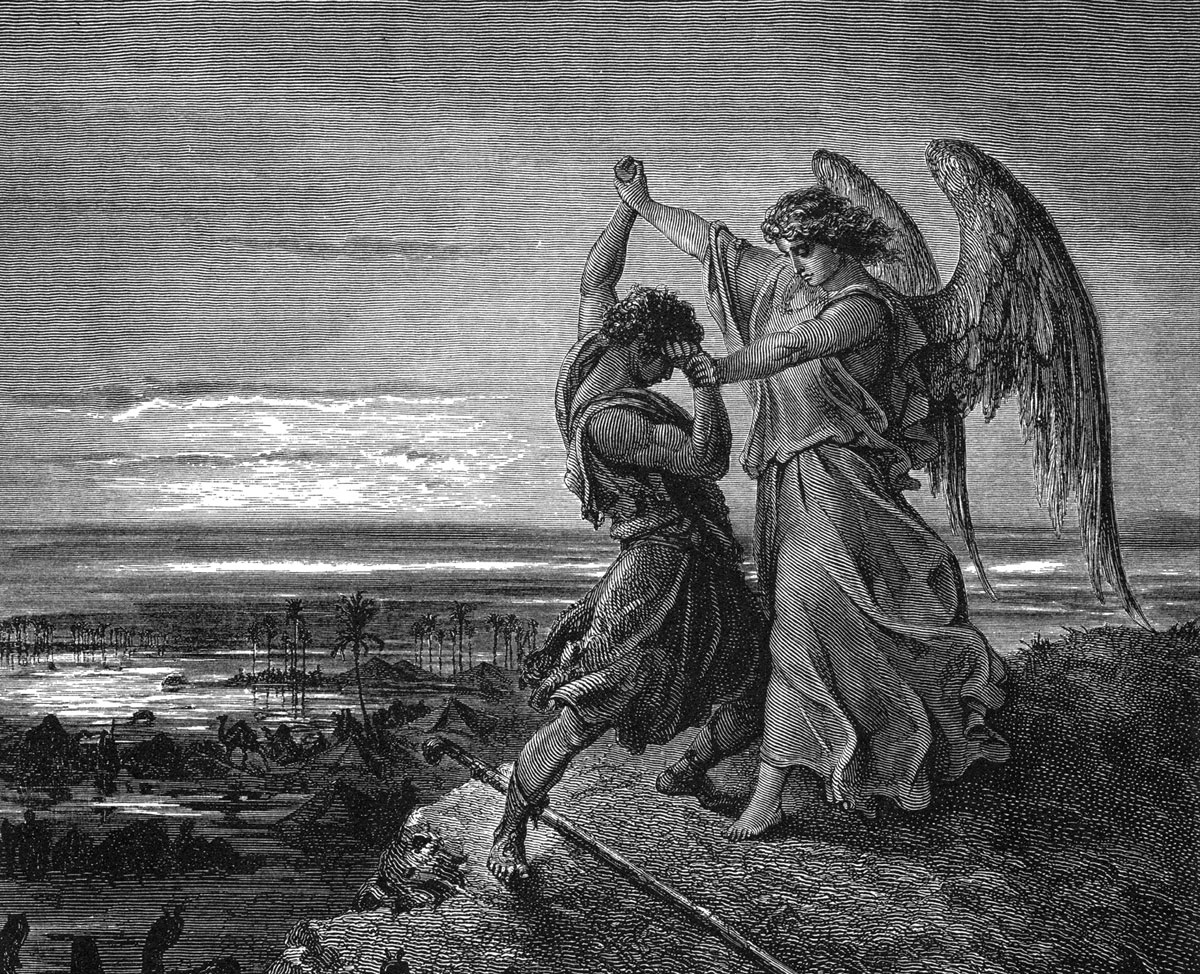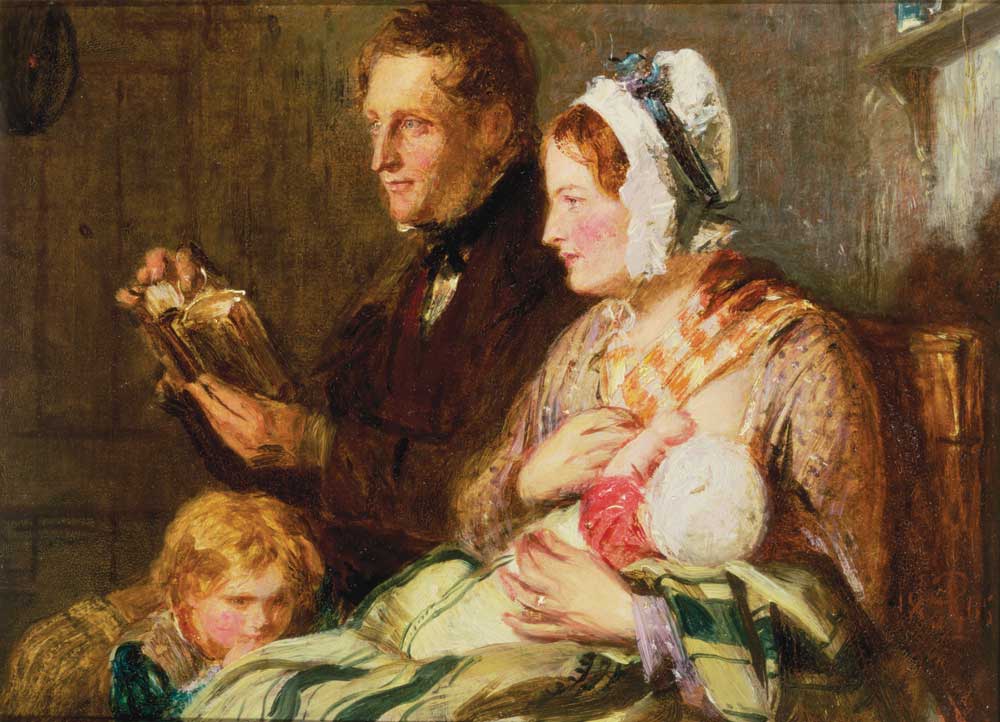Feature
Common Sense
Chesterton & the Aristotelian Tradition
by Patrick Henry Reardon
G. K. Chesterton could not have been more explicit about his admiration for Aristotle, whom he described as “perhaps the wisest and most wide-minded man that ever lived.”1 Nor was that admiration incidental or peripheral to Chesterton’s thought. Indeed, I hope to demonstrate that he stood habitually on the side of Aristotle, not only by reason of temperament and instinctive sympathy, but also by a fully conscious conviction, well thought through. That loyalty to Aristotle, moreover, was of a piece with Chesterton’s sustained trust in common traditions and his preference for democratic government and popular tastes, along with other aspects of his wide-ranging interests and concerns. These latter included, for example, his abiding love for and defense of medieval Europe, concerning which he wrote that “nobody understands the Middle Ages without realizing that the mind of Aristotle was still labouring in its midst like a mighty mill.”2 I hope especially to explain, in the latter part of this essay, how Chesterton’s constant reliance on what he called “common sense” was related to and developed from an important feature of Aristotelian psychology.
Just the Facts
Chesterton was explicit about what he found most attractive in Aristotle: a native disposition to begin reflective thought, not with a quest of eternal and self-evident first principles, but with the external data of material realities perceived through the various senses of the body, data that will subsequently be classified, analyzed, and assessed by the critical power of reason. The abiding value of Aristotle, Chesterton believed, had to do with his insistence on starting the process of understanding with “a middle field of facts which are given to the senses to be the subject matter of reason.”3 Thus Chesterton may speak of “the Authority of the Senses, which is from God.”4
To understand Chesterton’s respect for the Aristotelian habit of commencing with the experience of the material world and the bodily senses, it will be useful to look more closely at this aspect of Aristotle and see how it distinguishes his approach from that of his teacher Plato. A simple way of making this inspection is provided by Rafael’s famous mural, The School of Athens, where the artist arranged various pagan philosophers (along with Averroës, himself, and his ever-present friend, Della Rovere) into two groups associated with two central figures, Plato and Aristotle, these latter standing side by side. The diverse physical postures of these two contrasted thinkers serve to convey the distinctive methods that Rafael correctly perceived to separate them.

In the painting, Plato is placed to the viewer’s left, his feet advancing in a graceful stride, his left hand grasping a book in a completely vertical position, parallel to his body, while the first finger of his right hand is raised on high, pointing to unchanging first principles, the eternal Ideas. The painting thus portrays Plato’s tireless quest of transcendence and his concomitant thesis that the material world, since it is unstable and forever in flux, provides no proper starting point for the study of philosophy. Therefore, Plato immediately directs our gaze to eternal thought, to the very mind of God, to those undying Forms on high, of which the material world can offer us only the faintest silhouettes, as it were, mere shadowy outlines reflected on the back cave-wall of thought.
In contrast to Plato, Aristotle stands solidly in Rafael’s painting, both feet set firmly on the earth, his right hand spread out flat in front of him, palm down, indicating the circumambient world of physical reality, that extended plethora of factual data known to our senses. The book in Aristotle’s left hand lies almost horizontal, tilted upwards ever so gently, as though to suggest that the ascent of his thought will be more gradual, more cautious and circumspect in its methods, more modest, perhaps, in its hopes. In contrast to Plato, Rafael is telling us, Aristotle does not begin philosophy with a bold soaring for the eternal verities, but with the humble inspection of what his bodily senses have to tell him. He does not start by studying the permanent structures of mathematics in order to attain the even loftier heights of metaphysics, but by the rather pedestrian pursuit of “kinetics,” or physics, that is, the systematic observation of bodies in motion through space. He begins, in short, with what his five senses tell him of reality.
The inconstant nature of physical things, their fluidity and fluctuation, their inherent disposition to “move,” had suggested to Plato that the testimony of the senses could not be fully trusted. Sense knowledge, therefore, was unable to provide a proper starting point for systematic, critical thought. Plato reasoned that the bodily senses, being themselves physical, were just as prone to instability as the physical world that they observed.
But what Plato had considered a stumbling block, Aristotle took as a stepping stone. He reasoned that, if motion is the feature most characteristic of physical reality, then the investigation of motion itself would logically be the proper place to begin the study of man’s place in this world.
Chesterton perceived a deep theological reason for finding this Aristotelian emphasis on empirical observation so congenial and so preferable to the approach of Plato. Simply put, he believed Aristotle’s approach to be amply justified by the Christian dogma of the Incarnation. Chesterton reasoned that if “matter” was good enough for God to assume in the Hypostatic Union, it should be a good enough place for human beings to start the process of human thought. The Incarnation, that doctrine of “the humanizing of divinity,” he wrote, “is actually the strongest and starkest and most incredible dogma in the Creed.”5 If God became man, Chesterton argued, if God actually took on human form and adorned himself in his own created matter, then it is entirely proper that man should commence his quest for God by a consideration of the material world.
For Chesterton, the great merit of St. Thomas Aquinas was in his “having recovered through Aristotle the most defiant of all dogmas, the wedding of God with Man and therefore with Matter.”6 As Chesterton saw it, one could not logically be a Christian, believing in the enfleshing of God, the resurrection of the body, and the sacramental principle of divine grace, without at least suspecting that there was something proper and correct in the philosophy of Aristotle:
After the Incarnation had become the idea that is central to our civilization, it was inevitable that there should be a return to materialism, in the sense of the serious value of matter and the making of the body. When once Christ had risen, it was inevitable that Aristotle should rise again.7
Tradition & Sanity
Reliable thinking, therefore, must begin with the sense of “things” rather than with the structure of thought. Even the rule of reason, the necessary and symmetric coherence of ideas to one another, according to Aristotle, was to be discovered by a process of empirical inquiry. One properly commences mental activity by examining, not the contours of the mind, but the construction of matter. Thus starting, the sane Aristotelian would then gradually build up his body of ideas, including the structure of logic itself, by accumulating and comparing the smaller, more pedestrian facts perceived in the world around him.
For Aristotle there were two very good reasons for taking this approach of starting with the facts:
First, it simply can’t be helped. Human beings are so put together that sense knowledge always precedes reflective thought. It is an obvious fact that everyone employs his empirical faculties long before he begins to use that inner critical faculty known as logic. Every baby who has ever existed, including the great Plato, was aware of his mother’s existence before he consciously reflected on his own.
Nor, furthermore, is there even the slightest chance of analytical thought taking shape in the mind without the referential force and coordinating function of language. Language, however, must be learned from without, through the senses. Indeed, the learning of language links the individual thinker, not only to the world that exists around him in the present, but also to the vastly larger world of the past. Before one’s thought ever begins to take form, language has already placed the human mind in the context of a specific history, an inherited tradition.
Chesterton appreciated this priority of language, even poetical language, to critical thought, remarking with respect to English literature, “that I knew a great deal of it by heart, long before I could really get it into my head. I knew pages of Shakespeare’s blank verse without a notion of the meaning of most of it.”8
Much impressed by this Aristotelian insight, Chesterton used it to explain the affinity we feel with the ancient cultures of the Fertile Crescent and the Mediterranean, an affinity that we do not sense with the equally ancient cultures of the Far East. According to Chesterton, we may study the latter as history, but not, strictly speaking, as tradition, and “history without tradition is dead.”9 That is to say, with respect to China and the rest of the Far East, we do not stand in a felt and identifiable continuity. The mind of ancient China remains external to us; it has made no formative contribution to the mental processes by which we study it. Our situation is quite other, however, with respect to the ancient cultures of the Fertile Crescent and the Mediterranean. In the latter case, the history involved is our own history, because Babylon, Egypt, Greece, and Rome have provided the very context and grammar of reflection by which we think of them. We know them from the inside; they are at the heart of our inherited culture.10
A second reason for starting philosophy with the external facts rather than the internal structure of the mind is that it provides something of a safeguard against insanity. If a person begins his critical thinking by examining the processes of his thought rather than observing the testimony of his senses, there is a genuine danger of the mind’s simply becoming trapped or lost inside itself. External semantics, therefore, must precede internal symmetry, objective reference to facts being an essential component of sanity. Without it a man’s mind may become a mill grinding away without adequate grist and thereby consuming its own substance.
As an Aristotelian, consequently, Chesterton was ever afraid of the “fixed idea,” the closed circle of an inadequate notion recommended to the mind by its internal coherence but never tested outside of the confines of its own idiom. “It is always perilous to the mind to reckon up the mind,” he said.11 Without the safeguard of a larger critical grammar, constantly furnished by the outer world of facts, an idiom runs the real risk of idiocy.
To neglect this truth of experience, Chesterton believed, is the path to madness. The truly crazy person is not the man who has lost his reason, but the man who has nothing left but his reason, thus reduced to a “panegoistic extreme of thought.”12 Such a one “moves in the old circular rut; he will go round and round his logical circle,” wrote Chesterton.13 To such a man, semantics is suspect, because it challenges the adequacy of his diminished mind; his thought has the perfect symmetry of a circle, because it is not burdened with the inconvenience of the facts outside of that circle. If his fixed idea makes sense on its own terms, then he assumes it to be true, and Chesterton observed that lunatic asylums are full of folk who entertain such a prejudice, confined “in the clean and well-lit prison of one idea.”14 What such persons really need, Chesterton insisted, is not a larger dose of reason, but a more robust contact with the outer world.15
The Democratic Preference
Since Plato distrusted the testimony of the senses, it was probably inevitable that he should distrust also the instincts of ordinary, sense-oriented people. The thought of Aristotle, on the other hand, who insisted on commencing with the testimony of the senses, provided a justification for trusting those ordinary perceptions of ordinary people. The latter are those “common” citizens who share common impressions and instincts, such as the wetness of rain and a spontaneous disposition to come in out of it. Such folk may or may not entertain complicated theories about the nature of rain, though occasionally they do. They may or may not compose poems about the rain, though sometimes they do. What is important to both Aristotle and Chesterton, however, is that these common folk have a pretty good idea what rain is, and how it feels, and what it is capable of doing for the freshness of the air and the potatoes growing in the fields. The more observant and reflective among these common people may also detect that rain, like the sunshine, tends to fall alike on the just and the unjust. Likewise, if too much rain begins to fall, common folk will probably obey the impulse to construct a shelter or the command to build an ark.
Since he begins thought by using his five senses, an Aristotelian like Chesterton is inclined to have a soft place in his heart for these common people and their common trove of natural and inherited wisdom. He adopts the view that “the souls of all the ordinary hard-working and simple-minded people are quite as important as the souls of thinkers and truth-seekers.”16 He tends to trust their outlook on reality over that of the abstract speculator, so lost in his inner thought that he forgets to come in out of the rain. Which is to say that the good Aristotelian, and most certainly Chesterton, cherishes a prior disposition to prefer the democratic impulses of culture. He feels more confidence in the tried-and-true experience of ordinary people than the theories of the experts. He will instinctively favor the legend told by the majority of people in the village over the book “written by the one man in the village who is mad.”17 Like the Founder of his religion, Chesterton will pick a jury of twelve good men and true for the really important things in life, such as deciding whether an accused man will live or die.
This democratic instinct in Chesterton, for which he saw great justification in the thought of Aristotle, prompted him to place enhanced value on popular tradition, which he regarded as the proper extension of a democratic sympathy. He wrote:
Tradition means giving votes to the most obscure of all classes, our ancestors. It is the democracy of the dead. Tradition refuses to submit to the small and arrogant oligarchy of those who merely happen to be walking about. All democrats object to men being disqualified by the accident of birth; tradition objects to their being disqualified by the accident of death. Democracy tells us not to neglect a good man’s opinion, even if he is our groom; tradition asks us not to neglect a good man’s opinion, even if he is our father. I, at any rate, cannot separate the two ideas of democracy and tradition; it seems evident to me that they are the same idea.18
The Sense That Is Common
Chesterton wrote incessantly of “common sense,” most often in its usual meanings of sound, practical judgment and the simple, largely inherited wisdom of sane human beings. For him, the expression especially implied a reliance on the actual existence of the physical world, man’s ability to know that world through his five senses and to scrutinize it through the processes of logic—“the conception of the sublunary world under the light of reason.”19
Nonetheless, Chesterton believed man’s common sense to be conscious of a great deal more than the merely physical world. If common sense, he reasoned, embraces that general perception of reality common to normal human beings, it must include also the various “dumb certainties of experience,”20 including man’s nearly universal sense of spiritual realities and psychic powers somehow at work behind the obvious scenes submitted to the bodily senses. Unlike the Scottish “common sense school” that arose in the eighteenth century to oppose the skepticism of Berkeley and Hume, Chesterton was convinced that “the general existence of a world of spirits and of strange mental powers is a part of the common sense of all mankind.”21
When he wrote, furthermore, of “a central common sense that is nourished by the five senses,”22 Chesterton showed himself familiar with a much older meaning of that expression, “common sense.” By calling the common sense “common,” Aristotle meant first of all that “common sense” is a kind of shared internal meeting place for a man’s five senses, a sort of inner forum where the five senses, pooling their resources and guided by the imagination and the memory, might work together to reach a . . . well, a consensus about external reality. Common sense is an internal faculty that coordinates the efforts of all of a man’s senses. Such was the original understanding of koine aesthesis translated into the Latin of the Schoolmen as sensus communis.
Aristotle’s original meaning of common sense, therefore, was that it gives coherence and shape to man’s external cognitive activity. It is man’s imaginative ability to integrate the diverse testimony of his senses into a cohesive whole. The “common sense that is nourished by the five senses” is that inner ability I have to present external reality to my mind. It is that inner theatrical stage, as it were, where the five senses, imagination, and memory combine to put on a kind of artistic production of what is outside me. Thus, I know the outer world through a sort of inner show, a “presentation” (a Vorstellung, as Schopenhauer called it). My common sense, moreover, is not something that I can know with my senses; it pertains rather to the immediate data of my consciousness.
Sense & Skepticism
To gain a better grasp of what Aristotle meant by the term common sense (or “Common Sense,” as Chesterton sometimes insisted on writing it), it may be useful to follow along the path of skepticism for a few brief steps and give some critical consideration to the sheer limits of our sense knowledge. If we can manage to suspend our common sense for a few minutes, however insane the effort may seem, perhaps the short exercise in skepticism may enhance our appreciation of the epistemological problem that Aristotle saw very clearly and, unlike Berkeley and Hume and their more recent disciples, was able to solve.
Let us conjecture, then, that I am confronted with the impression of some very mysterious object in front of me. I am disposed, by public tradition and popular prejudice, to call this object an egg.
To begin with, how do I know that this thing, whatever it is, is really there in front of me at all? Well, says the skeptic, strictly speaking I don’t. My five senses can know absolutely nothing of the existence of eggs. In fact, all that is happening to me, when in a fit of reckless enthusiasm and unwarranted audacity I claim to “see” an egg in front of me, is that the retinas in my eyes are being stimulated by random light rays, sending a sensation through my nervous system. My eyes, that is to say, don’t see eggs; they see only light rays. Eyes know nothing of eggs. My eyes, therefore, do not tell me, “This, friend, is an egg.”
Then, waxing foolhardy in my quest of the egg, I reach out and touch the alleged object in front of me, and there occurs a further stimulation in the nerve endings of my fingers. Aha, say I, my fingers agree with my eyes. But, responds the skeptic, why should I associate this sensation in my fingers with the simultaneous sensation in my eyes, much less relate both sensations to a common stimulating cause? (Nor, says the systematic doubter, can I truly know that there is such a thing as a “cause.” Causality is another of those popular biases from which the bottomless profundities of David Hume were to set free the human spirit.) My fingers, likewise, do not know about eggs.
Desperate for further evidence of my now hypothetical egg, perhaps I tap that alleged object ever so gently with the tip of my finger to create a slight sound, which is registered in my ears. But ears hear sounds; they don’t know about eggs.
Relentlessly pursuing, nonetheless, my aforesaid lamentable bias with respect to the existence of eggs, and still acting on the trembling conjecture that one of those elusive creatures may actually be sitting there in front of me, I proceed to pick up the supposed object, and hold it to my nose for a good sniffing, thereby adding yet another feeble and, I fear, soon-to-be-discredited testimony to my now thoroughly uprooted mind. Ah, it is of no use. My nose knows nothing of eggs.
There you have it, my nose agrees with my ears and eyes and fingers. But why should I trust their combined testimony, if all four of them are equally unreliable witnesses? That is to say, the putative egg, notwithstanding a public tradition and popular prejudice with respect to its existence, is appearing ever more implausible. Since my senses cannot be trusted, I can know only the inner egg of my mind. And I can know this inner egg only because I have created it.
All of these actions (seeing, feeling, etc.) are separate, according to the skeptic, recorded in five senses that are united only in my nervous system. Taken together, they amount to precious little solid information, far too little information for me to know for sure that there is really anything at all “out there,” much less an object so definite as an egg, independent of the wavering, erratic impulses of my bodily senses. Why, after all, should I believe that my senses are self-validating? Certainly the senses themselves make no such claim. In short, the sensual evidence for the egg’s existence is simply too risky. Thus, while nominalism and materialism were content to argue against eggness, skepticism insists on attacking the egg.
And even if, still following this same method of systematic doubt, I could manage, by a massive effort of unjustified trust, to convince myself that my eyes, ears, fingers, and nose were all dealing with exactly the same solid object out there, how can I know for sure that it is the same object as that which, yesterday, I called an egg? To do so, I would be obliged to rely on my memory. And why, pray tell, should I rely on my memory?
My plight would be pitiable enough if, at the end of my efforts to pursue the profundities of modern skepticism, all I could really know is the immediate testimony of my consciousness. Alas, however, I know even less than that. Since the continuity of my consciousness is the product of memory, and memory is as unreliable as my external senses, then the claims of consciousness itself are likewise unwarranted. And since the “self” is known only in this dubious experience called consciousness, then I cannot know for sure that the “self” really exists. Not only is there no cruel world out there to which one may say goodbye, there is no longer anyone left to say it.
Thus does the skeptical cerebration come full circle. Once I deny even that egg its clamoring claim on my mind, all the rest of this insanity follows. There is no external world known to the senses, no such thing as causality, no such being as the self. Detached and impenitent logic thus marches on bravely to madness. The correct place to begin, therefore, said Chesterton, is “the broad daylight of the brotherhood of men, in their common consciousness that eggs are not hens or dreams or mere practical assumptions; but things attested by the Authority of the Senses, which is from God.”23
Common Critical Sense
To be sure, Aristotle concedes, the inner picture composed by my common sense is the combined artistic work of my imagination and memory, making use of the data provided by my five senses. But this common sense itself is already critical, in that it is able to distinguish its own inner image from the reality perceived to be outside itself. A healthy common sense, relying on the testimony of memory, is in no danger of confusing the outer and known object from its own picture of that object.
Contrary to Hume, this does not mean that objective knowledge of outer realities is impossible. No, it is precisely the common sense that makes such knowledge possible. To say that the outer world cannot be known “in itself,” after all, means only that I do not know it “from the inside.” But not knowing external objects from the inside is hardly a disadvantage. If I were to know outward objects from the inside, I would have to know them through the inner processes of consciousness. I would have to know them exactly as I know myself; that is to say, my knowledge of them would be, in a most extreme degree, subjective.
So, says Aristotle, leave well enough alone. Anyone, or any one of the senses, may be deceived on a given occasion, obviously, but it is one of the important functions of common sense to discover such instances for what they are. That said, the common sense testifies to the reality and many of the characteristics of the outer world. Once a man has consulted his senses, especially perhaps his olfactory sense, he may safely crack open the egg and commence the preparation of his meal.
Most people seem to know this; at least the common people do, which consideration brings us to the more common meaning of “common sense,” which is to say, the ordinary practical good sense of ordinary people. However complex Aristotle’s argument to validate it, common sense pertains to the shared inheritance of the simple and the sane. It is a thing popular and democratic, in the etymological senses of those two favorite adjectives of Chesterton.
In thus arguing for the claims of our sense experience—the “authority” of empirical knowledge, so to speak—Aristotle justified what is sometimes called factual science. The latter, when combined with the formal structure of mathematics and the a priori laws of logic, is the foundation of all modern physical science, whose historical debt to Aristotle is massive.
Common-Sense Storytelling
Chesterton perceived, however, that art too, but especially rhetorical and literary art, stands in its own grand debt to Aristotle’s justification of empirical knowledge. To say, as Aristotle does, that our knowledge of the external world is mediated through the “common sense” is to place the powers of imagination and memory at the center of that knowledge. In the very act of bearing witness to the objective reality of the universe, that is, our common sense constructs an imaginative representation of it, using the full resources of its own interpretive powers and the associations of memory.
According to Aristotle, we do not see the world in a naked state, but only as clothed in the rich costumes of the memory and imagination. If the world appears to our minds as a coherent whole—which is something our individual senses, of course, cannot perceive—this coherence is itself crafted by the common sense. There is no such thing as an uninterpreted knowledge of reality. Even as we acknowledge the claims of the outer world, we commence our own commentary on that world.
Therefore, the act of knowledge is, first of all, an act. The common sense, composed of imagination and memory, does not lie passive to external stimulation. Its knowledge of external reality is, rather, an aggressive grasping in which the knowledge itself is contoured and contextualized according to the shape and dimensions of the grasp. According to Aristotle, we imaginatively shape the world in the very act of knowing it.
Now, extremely important among the contouring components of our imaginative knowledge is the work of language. Our integrating grasp of external objects and of their sundry predications is inseparable from the identifying phonics with which they are associated in our memory. In human beings at least, the common sense comes to its fullness in linguistic predication—that is to say, in the appropriate positionings of referent sounds that the grammarian will classify as nouns, adjectives, and verbs. The sentence itself thus takes its rise in the common sense, and for this reason our human knowledge of the world is inseparable from narrative. In however primitive a form, we begin to know the world by recounting it. The world we know is a world shaped by story.
This linguistic dimension of the common sense, of course, is what makes each man’s common sense a communion with the common sense of others. A truly common sense requires a common tongue, which is the prescriptive agent by which an individual man’s common sense is set in an interpretive tradition. To learn an inherited tongue is to be placed within an ongoing narrative that is exegetical of reality.
Language, then, adds perfection to the common sense, socializing it, shaping it to find its form in the dynamics of a particular culture, instructing it in the prescriptive standards of a given tradition. It is also chiefly through language that the common sense is related to man’s reason. By employing a schematic arrangement of sounds to give coherence to its picture of the world, the common sense provides the groundwork for abstract thought. A form of rhetorical narrative already stands in place, awaiting the delayed arrival of critical reason at about age six.
The Life of Practical Romance
Chesterton marveled at what seemed to his mind the mystic associations of ordinary things. Even as his five senses informed him that he stood in the solemn presence of an egg, the testimony of his memory reminded him that, with very little warning, an egg might be transformed into a chicken, even though hardly any two things could be less alike than the curving symmetry of the egg and the haphazard, rambling activities of that erratic fowl.
Such utterly improbable associations of apparently unrelated objects, associations nonetheless obvious to the common sense, were for Chesterton the root of man’s sense of magic, and they guaranteed that common sense was not to be tied entirely to the prosaic. Indeed, a truly sane common sense would come to expect some occasional improbabilities attached to the ordinary experience of daily life. The latter, therefore, he called “this life of practical romance; the combination of something strange with something that is secure.”24
Thus, the foundational narrative of the common sense, in its incessant effort to interpret the world, finds itself moving easily in the direction of the fairy tale. If an egg can, virtually without notice, become a chicken, why cannot a bear become a prince?
As ideas, the egg and the chicken are further off from each other than the bear and the prince; for no egg in itself suggests a chicken, whereas some princes do suggest bears. . . . When we are asked why eggs turn to birds or fruits fall in autumn, we must answer exactly as the fairy godmother if Cinderella asked her why mice turned to horses or her clothes fell from her at twelve o’clock. We must answer that it is magic.25
For Chesterton, then, the sense of magic is a function of interpretive narrative arising spontaneously from man’s common-sense observation of his circumambient world. To say that I can know the world only through an imaginative reliance on words and sentences is to open the door on fairyland and many another sort of story.
Here we have, Chesterton believed, the font of all narrative. Because human beings perceive the world about them through imagination, memory, and the inherited medium of language, their primary vision already has in it something of poetry, the symbolic verbal crafting of an insight. All literature, at least all literature worth reading, rests on the solid foundation of the common sense. All theater, at least all theater worth seeing, is an extension of that primal process by which a human being presents reality to his own mind. Coming to him through his five senses, the landscape surrounding a man’s life assumes, by the integrating poetry of his common sense, those narrative dimensions that Chesterton called “the acted allegory of human existence,”26 the “sense of the miracle of humanity itself.”27 •
Patrick Henry Reardon is pastor emeritus of All Saints Antiochian Orthodox Church in Chicago, Illinois, and the author of numerous books, including, most recently, Out of Step with God: Orthodox Christian Reflections on the Book of Numbers (Ancient Faith Publishing, 2019).
subscription options
Order
Print/Online Subscription

Get six issues (one year) of Touchstone PLUS full online access including pdf downloads for only $39.95. That's only $3.34 per month!
Order
Online Only
Subscription

Get a one-year full-access subscription to the Touchstone online archives for only $19.95. That's only $1.66 per month!
bulk subscriptions
Order Touchstone subscriptions in bulk and save $10 per sub! Each subscription includes 6 issues of Touchstone plus full online access to touchstonemag.com—including archives, videos, and pdf downloads of recent issues for only $29.95 each! Great for churches or study groups.
Transactions will be processed on a secure server.
more on philosophy from the online archives
more from the online archives
calling all readers
Please Donate
"There are magazines worth reading but few worth saving . . . Touchstone is just such a magazine."
—Alice von Hildebrand
"Here we do not concede one square millimeter of territory to falsehood, folly, contemporary sentimentality, or fashion. We speak the truth, and let God be our judge. . . . Touchstone is the one committedly Christian conservative journal."
—Anthony Esolen, Touchstone senior editor





